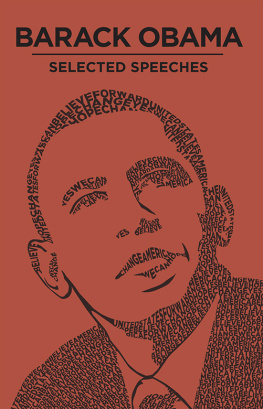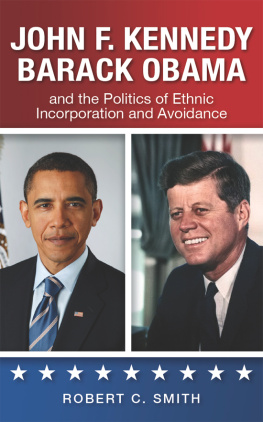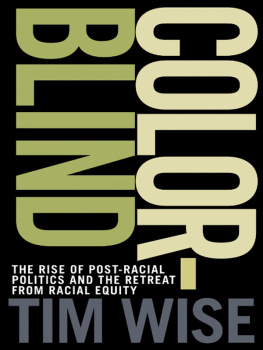DOUBLE-CONSCIOUSNESS
AND THE RHETORIC OF
BARACK OBAMA
Studies in Rhetoric/Communication
Thomas W. Benson, Series Editor
Double-Consciousness
and the Rhetoric of
BARACK OBAMA
The Price and Promise of Citizenship
Robert E. Terrill
2015 University of South Carolina
Published by the University of South Carolina Press
Columbia, South Carolina 29208
www.sc.edu/uscpress
24 23 22 21 20 19 18 17 16 15
10 9 8 7 6 5 4 3 2 1
Library of Congress Cataloging-in-Publication Data
can be found at http://catalog.loc.gov/ .
ISBN 978-1-61117-531-8 (cloth)
ISBN 978-1-61117-532-5 (ebook)
For Debbie
Contents
CHAPTER 1
Inventional Criticism
CHAPTER 2
Democratic Double-Consciousness
CHAPTER 3
A More Perfect Union
CHAPTER 4
The Confines of Race
CHAPTER 5
Beyond the Veil
CHAPTER 6
Citizenship and Duality, Rhetoric and Race
Series Editors Preface
In Double-Consciousness and the Rhetoric of Barack Obama, Robert Terrill discovers in the rhetoric of Barack Obama a consistent practice of double-consciousness, a concept traced to the work of W. E. B. Du Bois, but applied by President Obama, claims Terrill, with a new range of effects and potentials. In The Souls of Black Folk (1903), Du Bois wrote that the circumstances of African American life had prompted the development of double-consciousness, not a true self-consciousness, but a sense of always looking at ones self through the eyes of others.... One ever feels his two-ness,an American, a Negro; two souls, two thoughts, two unreconciled strivings; two warring ideals in one dark body, whose dogged strength alone keeps it from being torn asunder. The rhetoric of Barack Obama, notes Terrill, is not directly derived from nor identical with the double-consciousness described by Du Bois, but it is analogous to it in the sense that Obama typically credits alternating perspectives and points of view. From Obamas practice, using a mode of critical analysis he calls inventional criticism, Terrill develops the concept of democratic double-consciousnessan attitude and practice productive of democratic civic engagement. Democratic double-consciousness, as it is demonstrated by Barack Obama, is not simply a tactic in a zero sum game of competitive persuasion, nor even an effort to create a transcendent synthesis, so much as it is a habit of recognizing the legitimacy of opposing sides, of rejecting false binaries, choosing outcomes that solve problems while preserving dualities. The democratic rhetoric of double-consciousness is energetically engaged, but also reflective, hesitant, modest, and open to a multiplicity of perspectives. Such a rhetoric is likely to be deplored by those who enter political or rhetorical engagements seeking merely victory, unity, and moral certitude.
Professor Terrill guides us through the theoretical underpinnings of double-consciousness and in a series of case studies of the speeches of Barack Obama he shows what democratic double-consciousness looks like in practice, with variations adapted to the contingencies that shaped speeches on race, religion, rights, peace and war, health care reform, the economy, and the responsibilities of democratic citizenship.
THOMAS W. BENSON
Preface
This book has its genesis in two rather commonplace and overlapping observations: the study of rhetoric fosters particular forms of duality, and effective democratic citizenship also requires particular forms of duality. This book, fundamentally, is an attempt to begin to work out some possible points of connection between these two apparently parallel notions.
The interdependence of rhetoric and democracy has long been noted, of course, often described in terms of a sort of baseline rhetorical competence that is required if citizens are to participate in civic culture. But I was intrigued by a particular component of rhetorical competence, one associated less with instrumental advantage and more with the extent to which the gaining of rhetorical competence entails the cultivation of attitudes or perspectives that are of particular value to democratic practice. In other words, I was interested in exploring the idea that the foundational necessity of rhetoric to democracy has more to do with the doubled habits of thought and speech that it cultivates than with the fact that studying rhetoric can improve the ability of citizens to present themselves effectively.
I spent a good deal of time thinking about ways to make this connection. The ancient rhetorical canon of invention emerged as a fertile locus of inquiry because it requires a doubled attention to self and to audience, an oscillation between the motives of interpretation and production, that seems particularly valuable to civic discourse. It became evident that the foundational pedagogical practice known to rhetoricians as imitatio, especially as it is implicated in the cultivation of an inventional facility, also was significant in this regard. I returned, as I so often do, to the work of W. E. B. Du Bois, and in particular to his discussion of double-consciousness in his monumental work The Souls of Black Folk, which reinforced my conviction that any discussion of duality and democratic citizenship must engage race. And as I explored the literature on practices of democratic citizenship, it became clear that some sort of duality often was evoked as a trait of the ideal citizen.
But the sort of rhetorical criticism that I practice requires an object of study, a collection of texts, a representative figure. In one of the documents I had produced for my tenure case, I had described a future project as consisting of a loosely connected collection of analyses of various manifestations of political duality in public and popular culture. I pursued that for a while, but quickly I discovered that to produce a coherent argument I needed instead to focus on a single exemplar rather than a scattering of case studies.
And then, as if on cue, came the ascendancy of Barack Obama. And I initially took little notice. By spring 2008 I was aware of him, of course, but wasnt following him closely. National elections tend to bring my inner cynic to the surface, for one thing, and, besides, Hillary Clinton was still the presumptive Democratic candidate. While Obamas growing reputation was built primarily on his oratorical skills, what I had heard from him thus far had not impressed me. When Obama came to Bloomington in April, my family and I joined the crowds gathered on Kirkwood Avenue, and my son reached out and shook his hand, but otherwise he occupied only the periphery of my consciousness.
Then one afternoon late in that semester, a graduate student, Kathleen McConnell, came into my office, and in the course of talking about other matters she asked me if I had seen or read the speech that Obama had given on race back in March. She knew that I had been thinking about duality and citizenship, and she thought I might find that Obama had said something interesting about those topics in his address. Several weeks later, when I finally got around to reading the transcript, I found, unsurprisingly, that she was correct. I began to take notice and then notes and discovered that Obama presents himself, not only in that speech but also habitually, as a sort of icon of duality, both a speaking embodiment of a doubled attitude and an idealized democratic citizen, so that he and his public discourse presented an ideal opportunity to explore the issues which had come to be of interest to me.








